
If your company is considering launching your first e-commerce store or redesigning your current website, you may be overwhelmed by the available platform options. In this article, we will compare two of the leading e-commerce platforms on the market: SuiteCommerce Advanced and Shopify Plus. While each of these services offers a tiered feature approach (reflected in a tiered pricing structure), this comparison will highlight the pros and cons of each provider’s most advanced offering.
1. Website Themes
Beginning the design of your web store from a base theme will save time and money. In the simplest version of your website launch, you will be able to simply choose a theme, input your products and content, and launch your site.

SuiteCommerce Advanced
This platform offers a total of 6 free themes that are flexible and can be customized to fit your business. However, if your business is looking for an even more unique site design, there is also a wide variety of paid SuiteCommerce themes available from 3rd party developers.
- Pro: The 6 free SuiteCommerce themes are stunning and customizable, perfect for a company wanting to save a bit of money.
- Con: There's really no con here. While it is understandable that some companies won't want to spend extra for a paid theme, the benefits of a unique design can far outweigh the cost.
If you are trying to decide between using a free theme or paying for that extra edge over your competitors, you might want to visit some demo websites for SuiteCommerce themes. These websites have been set up by developers to showcase the various design capabilities within SuiteCommerce, and to inspire you as you begin the process of selecting your e-commerce design.
Shopify Plus
This e-commerce solution comes with 9 free themes that you can choose between when creating your website. If these free themes are insufficient given the needs of your business, there are many more paid options available.
- Pro: The 9 free Shopify themes are a good way to save money, while the paid themes help you stand out from the crowd.
- Con: The free Shopify themes are widely used, so it is quite likely your online store will end up looking a lot like your competitors'.
To browse and purchase a Shopify Plus theme, visit the Shopify themes store, where they have listed themes by price, industry, collection, design, and more.
"Website Themes" Champion
It's a close call. In fact, could almost call it a tie, but SuiteCommerce Advanced seems to have a bit of an edge here. The biggest difference between the two platforms is that Shopify Plus has a larger number of themes available, while the SuiteCommerce Advanced themes tend to be a bit more versatile overall. In other words, after you have implemented a particular theme, you have more freedom and flexibility within SuiteCommerce Advanced than you do in Shopify Plus.
2. Ease of Customization
To make the look, feel, and functionality of your website truly unique, it is likely that you will want to make changes to whichever base theme you choose to start from. These customizations can be as simple as changing colors and fonts, or as complex as building an entirely new checkout process.

SuiteCommerce Advanced
SuiteCommerce Advanced is built using standard HTML, CSS, and JavaScript, which means that a developer will be able to make customizations without having to learn a whole new coding language. SuiteCommerce Advanced also includes version locking, which keeps your customizations from breaking during a version upgrade.
- Pro: The coding languages used in SuiteCommerce Advanced are common, and version locking keeps those customizations intact.
- Con: Again, there's really no con here. SuiteCommerce Advanced gives developers complete access to the source code, so when it comes to customization... the sky is the limit!
If there are complex SuiteCommerce customizations that your company wants help implementing, reach out to a NetSuite developer. A developer can either do the customization for you, or they can walk your team through the process, teaching valuable skills as they go.
Shopify Plus
Unlike SuiteCommerce Advanced, Shopify Plus requires developers to have additional knowledge of Liquid, a template language that was created by and is specific to, Shopify. Shopify Plus also has no version locking in place, so your developers will have to repair any broken customizations every time there is an update.
- Pro: Many fine-tuned customizations can be made in Shopify Plus.
- Con: Developers need extra knowledge of Liquid, and a lack of version locking creates a lot of extra work for developers when customizations break.
Shopify Plus is a flexible platform that can handle detailed customizations, however, these changes are difficult to make and preserve without outside help. Your company may have to hire an additional employee who is already skilled in Liquid, train your in-house developers in Liquid, and/or outsource work to a Shopify developer who can take the reigns.
"Ease of Customization" Champion
Both e-commerce solutions offer customization capabilities, but two key differences put SuiteCommerce Advanced in 1st place. First, the fact that SuiteCommerce Advanced works off of common coding languages is a huge plus if your developers are not versed in Liquid. Second, the version locking provided by SuiteCommerce Advanced helps preserve the hard work your developers have completed and protects customizations from breaking unexpectedly.
3. Add-ons
Writing customizations into the code is a great way to meet your company's needs, but there is no need to waste time creating a customization that already exists. There are many apps available for SuiteCommerce Advanced and Shopify that developers have already spent hours creating.
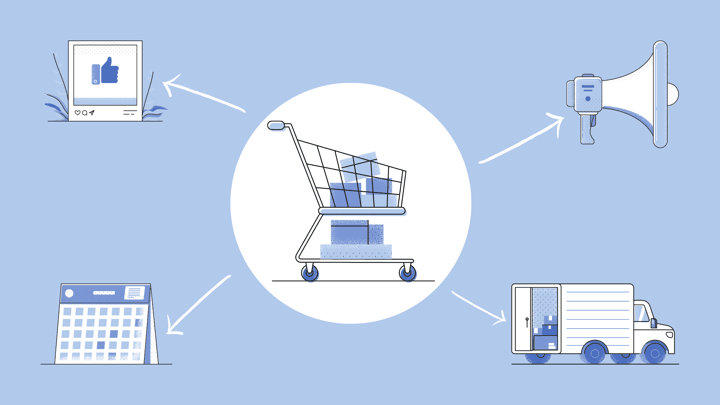
SuiteCommerce Advanced
While SuiteCommerce Advanced gives developers direct access to the source code, it's still a good idea to use third-party SuiteCommerce apps for more complex processes.
- Pro: Add-ons can save your team time and energy on complex customizations.
- Con: Some third-party apps are poorly built, so its important to find SuiteCommerce add-ons through a reliable source.
Editing the code on your own is a great option for smaller customizations in SuiteCommerce Advanced, but the workload can be lightened through third-party apps. Again, you will just want to make sure an app is coming from a trusted source before adding it to your website.
Shopify Plus
The best place to find apps for this solution is the Shopify App Store, where there are a large number of Shopify apps listed which have been built by various developers. While all of these customizations are marketed on Shopify's website, it is important to note that they have been built to work with Shopify, but not with the other third-party apps listed on the Shopify website.
- Pro: Shopify Plus currently offers a larger number of third-party applications.
- Con: Using too many third-party plugins at the same time can lead to clunky integrations.
When the customizations within Shopify can't meet your business' needs there are a large number of add-on solutions available. However, Shopify's lack of version locking makes using a wide variety of add-ons more difficult to manage.
"Add-ons" Champion
Last time there was a close call SuiteCommerce Advanced seemed to pull ahead just a little, but this time Shopify looks like they might have it in the bag. While both solutions have good add-on capabilities, Shopify has more apps available at this point in time. Just remember that this can also be a downfall since connecting too many third-party apps can leave a developer with a web of plug-ins that is nearly impossible to navigate and keep up-to-date.
4. ERP Integration
Having a pretty storefront is only one part of the equation of building a successful e-commerce website. When you need to track inventory, sales, order fulfillment, and customer relationships, the use of an ERP platform will become necessary.
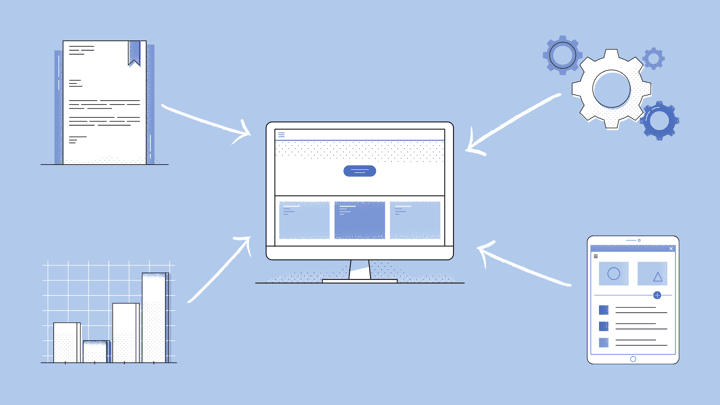
SuiteCommerce Advanced
One of the biggest perks of SuiteCommerce Advanced is that it seamlessly integrates with NetSuite (a leading ERP software) to manage all backend operations. If your business already uses NetSuite, then this is really a no-brainer.
- Pro: Seamless integration with NetSuite ERP software.
- Con: Since SuiteCommerce Advanced is built by NetSuite for NetSuite, any company working with a different ERP software will want to look into the cost of implementing NetSuite.
Whether your company has used NetSuite for years, or you cringe at the thought of switching your ERP to support SuiteCommerce Advanced, you should reach out to a NetSuite Partner to learn more about budget-friendly NetSuite implementation. Switching over ERP solutions sounds daunting at first, but after a little research, you might find that it would greatly benefit your company.
Shopify Plus
Shopify Plus requires additional integration with a 3rd party ERP platform to effectively manage backend options. This means that your company will need to pay for a Shopify connector (integration between the platforms). In addition to increasing costs, potential snags can occur in the integration.
- Pro: Can be integrated into a variety of ERP systems, (but none of these integrations are seamless).
- Con: Efficiently managing a large store can be more difficult since Shopify Plus doesn't seamlessly integrate with a family of ERP and business management modules as SuiteCommerce Advanced does.
Shopify Plus is a good option if you don't use NetSuite, won't need NetSuite any time soon, and are happy with your company's current ERP and business management system. But, if scaling and efficiency are big parts of your company's strategic plan for the next 5-10 years, NetSuite might be worth a look.
"ERP Integration" Champion
SuiteCommerce Advanced definitely has better ERP integration, and not just compared to Shopify. If your business is running into conflicting processes and struggling to match up data from various areas of the business, it's probably time to get a solution that works as a unified business management platform. SuiteCommerce Advanced was made by NetSuite for NetSuite, and the ERP integration is the best one out there.
5. Web Store Functionality
Once your web store has been initially built and customized, many important questions about how your products will display and be managed will naturally arise.
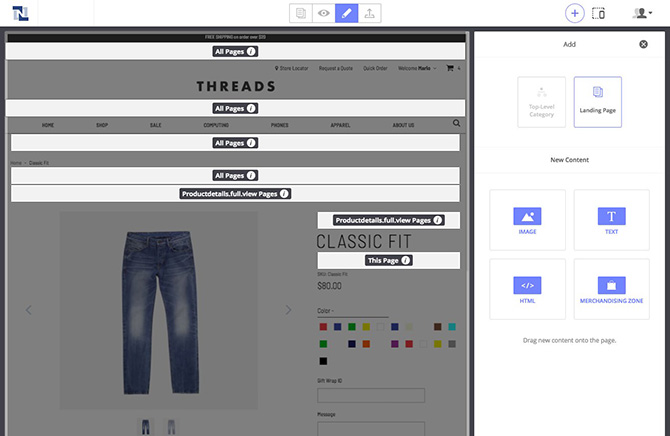
SuiteCommerce Advanced
SuiteCommerce Advanced successfully manages larger product SKU batches and product variants than Shopify does. SuiteCommere Advanced also offers a much deeper control over how your products display, allowing for the promotion of things like featured products, best sellers, etc. by integrating data from NetSuite.
- Pro: Greater display control, and larger SKU capabilities.
- Con: Really none. If your company does find that any webstore functionality is lacking, your need can likely be met through customization or add-on.
SuiteCommerce Advanced is a platform focused on a high level of performance, and a big part of outperforming competitors is having a more robust offering of features and capabilities. If these kinds of capabilities are important to you then SuiteCommerce Advanced would likely be a good fit, while the rigidity of Shopify Plus may frustrate you.
Shopify Plus
Shopify Plus intuitively displays products on your live site in a standardized way due to the nature of Shopify themes, which works well if you love the product display in the theme you chose, and if you don't plan on doing specialized promotions. The Shopify webstore is also typically quicker and easier to set up, but only if your store carries a limited number of SKUs.
- Pro: Easier to set up than SuiteCommerce Advanced.
- Con: Limited number of SKUs, and fewer product listing customizations.
If you want a nice, clean website that minimizes decision making when it comes to product listing and promotion, Shopify Plus is a good choice. However, if customization is important to you, you may want to choose a different e-commerce platform.
"Web Store Functionality" Champion:
When it comes to Web-store functionality, SuiteCommerce Advanced simply performs on a higher level. With more control over promotions, display, and other product-specific options, you have the freedom to showcase products in a variety of ways. This enables you to capitalize on the responses of your customers, thereby increasing customer engagement and driving up sales.
6. B2B Features
If your company operates in the B2B space, your e-commerce platform will need to manage many unique challenges.
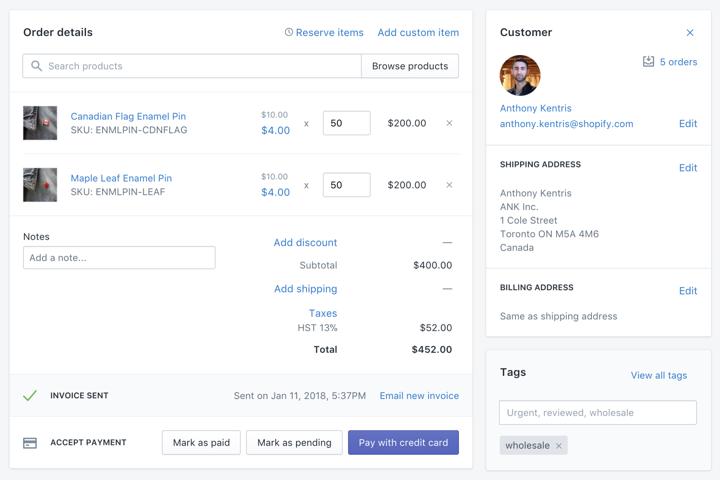
SuiteCommerce Advanced
SuiteCommerce Advanced provides deeper control over B2B functions such as tracking sales through additional channels outside of your web store. Other native tools include estimates and quotes, as well as stock visibility for users.
- Pro: Includes a large number of native customizations for B2B e-commerce features including custom prices, terms, and credit limits.
- Con: None. SuiteCommerce Advanced is perhaps the most robust platform out there when it comes to B2B e-commerce, and if you do find a feature that is missing, it can likely be added through a customization or third-party app.
If your business focuses on B2B e-commerce, SuiteCommerce Advanced is likely the best platform available to you. This is especially true since the seamless integrations with NetSuite ERP and modules such as NetSuite Advanced Inventory enable unified company-wide management and reporting, which is lacking in other B2B e-commerce platforms.
Shopify Plus
Shopify Plus does offer a Wholesale Channel, but it only includes limited native functionality. Most features that would be expected from a B2B e-commerce platform must be purchased separately in third-party plugins.
- Pro: Good if your business is just beginning B2B e-commerce, serves only a few B2B customers, or sells only a few standard B2B products.
- Con: Lacks many common B2B e-commerce customizations such as different payment options, custom credit, removing or reducing shipping costs for users, etc.
The bottom line is that B2B e-commerce can technically be performed through Shopify Plus, but it will likely require several customizations and additional third-party app purchases. If B2B is a large part of your e-commerce efforts, you might want to choose an e-commerce solution with more native features.
B2B Features Champion
SuiteCommerce Advanced is the better option for B2B by a long shot since it includes a much larger number of native B2B features. The platform has great functionality in key areas related to purchasing, billing, and service/self-service. In contrast, Shopify Plus lacks several of these key features, and really won't work very well well for anything other than very limited B2B e-commerce.
7. Global Ecommerce
Businesses looking to sell products internationally need to be able to meet a wider variety of needs among their customers. Their e-commerce site needs to include a greater number of languages, international currency payment methods, and flexible shipping options.
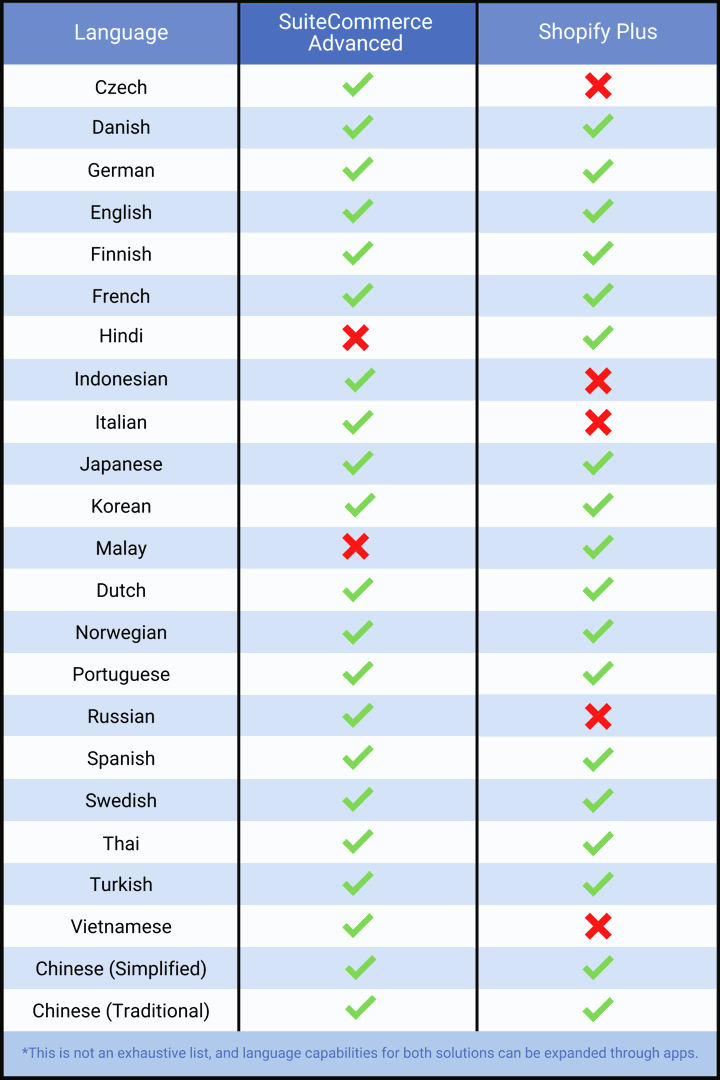
SuiteCommerce Advanced
SuiteCommerce Advanced supports more language and payment options than Shopify, allowing you to reach more customers.
- Pro: A wide global reach, enabling you to grow your business and never slowing you down.
- Con: You may run into problems if you sell to a group of people who speak a less-common language, or who live in a country with changing currency, but this is true for all e-commerce platforms and can be addressed by customizations.
The platform also includes global ecommerce tools that enable the management of multiple tax rates, currencies, and consolidated multi-subsidiary reporting.
Shopify Plus
While Shopify Plus also includes a variety of language options, its not so easy to implement multiple languages on one site. Additionally, other global e-commerce tools related to shipping and payment methods are a bit lacking in comparison with SuiteCommerce Advanced.
- Pro: Includes enough global options to sell in major countries and meet most customers' needs.
- Con: Lacks some of the customizations that are necessary to deliver the best service, and some customers have complained about language issues related to the checkout page.
If your global e-commerce needs and plans are limited to major markets, Shopify will meet your business' needs. However, if you are aiming to reach smaller, more specific markets, you should check to make sure Shopify Plus has the features you need.
"Global Ecommerce" Champion
SuiteCommerce Advanced takes 1st place again. SuiteCommerce Advanced has more global e-commerce options out-of-the-box, while Shopify Plus requires extra customizations and add-ons to achieve the same results. However, unless your global e-commerce efforts are extensive, Shopify Plus could likely meet your needs through the use of third-party plugins.
.
VIDEO: SCA vs. Shopify Key Takeaways
While both SuiteCommerce Advanced and Shopify Plus provide powerful e-commerce solutions, they excel in solving different kinds of problems. A thorough assessment of your company's needs will shed light on which platform might be right for you.
If you are a new startup with revenue under $1 million then Shopify is the clear choice simply due to pricing. You probably don't have NetSuite yet either which would make SuiteCommerce unavailable. If you are a company that is planning to have NetSuite, then SuiteCommerce makes a lot of sense to implement. Typically, companies start to actively look at NetSuite and SuiteCommerce when they reach approximately $8-10 million in annual revenue.
Shopify tends to have a larger volume of developers because there are more active websites using its system at the moment. It makes sense that they have a larger market share since only NetSuite users have access to SuiteCommerce. When you have a larger pool of developers available, you can probably find developers for a little less per hour. However, you will still need someone knowledgeable in NetSuite to perform integrations, scripts to manage data, and support Shopify data. Even though there are a lot of Shopify developers, there are a select few (even less than SuiteCommerce) that also have the necessary expertise in NetSuite.
When trying to decide which option is best for you, it is more important to build out your requirements for the ecommerce website and try to anticipate your growth needs. This will help make the comparison easier. Then you can dive into the specific functionality as it relates to your business. If you have already done this, then feel free to contact our team for a demo of the native SuiteCommerce features.
Hopefully, this post gives you something to work with while trying to understand NetSuite and what it can do for your business. If you have any questions and want some free consulting advice, feel free to contact our team at Anchor Group.
